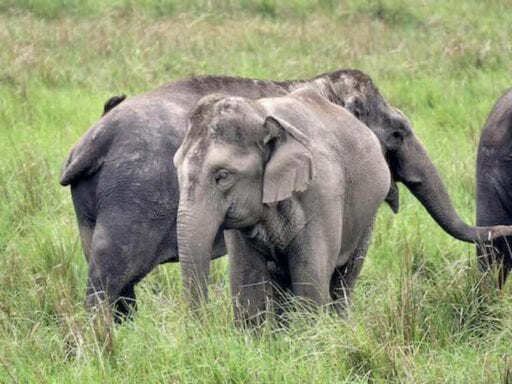Vox Sentences is your daily digest for what’s happening in the world. Sign up for the Vox Sentences newsletter, delivered straight to your inbox Monday through Friday, or view the Vox Sentences archive for past editions.
A million species are at risk of extinction, and humans are to blame; a ceasefire between Palestinian militants and Israel marks a temporary end to violence in the Gaza Strip.
Biodiversity is declining at an unparalleled rate
/cdn.vox-cdn.com/uploads/chorus_asset/file/16217491/5.6.jpg) Anuwar Ali Hazarika/Barcroft Images/Barcroft Media via Getty Images
Anuwar Ali Hazarika/Barcroft Images/Barcroft Media via Getty Images- The United Nations reported that nature is declining at an unparalleled rate, and humans are the case. [Washington Post / Darryl Fears]
- The UN’s biodiversity report outlines a shocking reality: 1 million species are on the verge of extinction, which threatens human survival as well. [National Geographic / Stephen Leahy]
- Climate change is the driving force behind this decline. Overfishing, the use of fossil fuels, pollution, and neglect of the growth of invasive species have also been identified as the cause behind the dwindling biodiversity. [NYT / Brad Plumer]
- While this isn’t the first report to predict Earth’s grim future, this report stands out because it details how humans drastically rely on the well-being of these specimens. The health of our ecosystem is directly tied to food security and access to clean water. [Smithsonian Magazine / Maddie Burakoff]
- The situation has already gotten so bad that small efforts will not suffice, and governments will need to make transformative changes if they want to save the planet. Some of the solutions suggested by the authors include adopting techniques that grow more food on less land and cracking down on illegal logging and fishing. [AP / Seth Borenstein]
- Nations have begun to recognize the threat of a failing ecosystem, and two high-level summits have already been scheduled for world leaders to discuss their conservation goals in 2020. [CNN / Isabelle Gerretsen]
- The UN report sends a dire message to all nations that action needs to be made –– quickly. Changing lifestyles to prevent a climate catastrophe may seem arduous, but the cost of doing nothing will be much higher. [Guardian / Robert Watson]
A momentary peace on the Gaza Strip
- After a weekend of violence that killed more than 20 Palestinians and four Israelis, Palestinian militant groups and Israel reached a ceasefire early Monday morning. [Guardian / Oliver Holmes]
- A series of incidents on Friday kick-started the violence: A Gazan shot two Israeli soldiers, leading to retaliatory strikes that killed two Hamas militants, and two Palestinians were killed by Israeli forces during a protest. [NBC News / Paul Goldman, Lawahez Jabari, Alex Johnson, and Yuliya Talmazan]
- This was the worst occurrence of violence since 2014, when both sides engaged in a 50-day war. Palestinian militants fired hundreds of missiles into Israel, while Israeli militants responded by targeting 350 sites with airstrikes. [BBC]
- It’s likely the timing partially contributed to the ceasefire, which was brokered by Egypt and backed by the UN. Israeli has Memorial Day, Independence Day, and the Eurovision contest coming up; many Palestinians will begin celebrating the holy month of Ramadan on Monday. [AP / Aron Heller and Fares Akram]
- The terms of the ceasefire have not been publicized but in the past have included measures that would ease the effects of the Gaza blockade. The problem is that there doesn’t seem to be any sign of long-term peace agreements, especially as violence between the two groups becomes more frequent –– the last attacks were just in March. [NYT / Isabel Kershner]
- Israeli Prime Minister Benjamin Netanyahu’s handling of Gaza is not popular. Members of his own party have criticized him for the ceasefire, saying he needs to be more decisive in his approach. [Jewish Telegraphic Agency]
- Civilians are weary of the endless violence, and the uneasy truce gives them little hope that they will find peace anytime soon. [Washington Post / Loveday Morris, Ruth Eglash, and Hazem Balousha]
Miscellaneous
- It’s a boy! Meghan Markle, Duchess of Sussex, has given birth to a son, who is seventh in line to the British throne. [BBC]
- After international backlash, Brunei is no longer enforcing the death penalty for those convicted of engaging in gay sex. [CNN / Ben Westcott and Rebecca Wright]
- Scientists are looking into why people turn to sad songs when they’re upset. As part of that research, a small study found that people with depression feel better after listening to sad music. [The Verge / Angela Chen]
- As alternative meats become more mainstream, scientists are developing technology to produce lab-grown fish. [NPR / Clare Leschin-Hoar]
- Straws, grocery bags, and water bottles are frequently targeted as the culprits behind plastic pollution. There is one category, however, that is often overlooked: clothes. [NBC News / Denise Chow]
Verbatim
“Humanity unwittingly is attempting to throttle the living planet and humanity’s own future. … The biological diversity of this planet has been really hammered, and this is really our last chance to address all of that.” [George Mason University biologist Thomas Lovejoy’s response to the UN biodiversity report]
Watch this: Save the salamanders, unsung heroes of the forest
Foreign salamanders could infect American salamanders with a flesh-eating fungus and destroy them. [YouTube / Estelle Caswell, Joss Fong, and Brian Resnick]
Read more
Meghan Markle’s postpartum privacy could be good for moms
The big business of loneliness
Game of Thrones’ Missandei controversy, explained
Cory Booker now has the most ambitious gun control proposal of any 2020 candidate
The unprecedented disqualification of a Kentucky Derby winner, explained
Author: Catherine Kim
Read More



